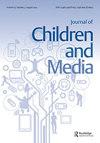Increasing knowledge about cognitive biases: An evaluation study of a radicalization prevention campaign targeted at European adolescents and young adults
IF 2.1
3区 心理学
Q2 COMMUNICATION
引用次数: 0
Abstract
ABSTRACT Confrontation with radical online content has been empirically linked to the facilitation of radicalization processes. Therefore, building a presence of information about potential prevention of radicalization through an online campaign may be particularly relevant to limit the activities and appeals of radical actors. In this study, we thus examine the effectiveness of campaign material focused on cognitive biases (i.e., when people's cognitive processes of information are systematically distorted). We test the success of the campaign material with respect to three campaign objectives: Building (1) knowledge about biases, (2) confidence to recognize biases, and (3) awareness and relevance of the issue. We conducted an online-experiment with adolescents (N = 223) comparing a control group (no exposure to the campaign material) to (A) a group that watched the developed campaign videos and (B) a group that watched the videos and took a self-assessment quiz. This comparison aims at testing how different levels of interactivity affect the three campaign objectives. The results suggest that the campaign materials increased knowledge about cognitive biases, but did not affect adolescents' confidence in recognizing biases and the perceived relevance of learning about biases. IMPACT SUMMARY Prior State of Knowledge Exposure to radical content online has been linked to facilitating radicalization processes. Therefore, building skills based on one’s susceptibility to radicalization (i.e., cognitive biases) may be a potential prevention measure that can promote media literacy and limit the appeal of radical actors. Novel Contributions This study shows that campaign materials can increase knowledge of cognitive biases and thus raise awareness of vulnerability to radical content. Nevertheless, an online campaign should ideally be accompanied by a broader and longer-term educational program to ensure long-term awareness. Practical Implications Since cognitive biases are a processing pattern that affects everyone, information about how one’s self and others are affected by it could lead to a normalization of reflection about biased processing. This could have a positive impact on more critical media literacy and should thus be pursued in future campaigns, educational offerings, and scientific studies.增加对认知偏见的认识:针对欧洲青少年和年轻人的激进化预防运动的评估研究
本文章由计算机程序翻译,如有差异,请以英文原文为准。
求助全文
约1分钟内获得全文
求助全文

 求助内容:
求助内容: 应助结果提醒方式:
应助结果提醒方式:


